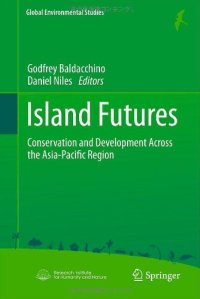
Ebook: Island Futures: Conservation and Development Across the Asia-Pacific Region
Author: Daniel Niles Godfrey Baldacchino (auth.) Godfrey Baldacchino Ph.D. Daniel Niles Ph.D. (eds.)
- Tags: Environment general, Environmental Management, Sustainable Development, Economic Geography
- Series: Global Environmental Studies
- Year: 2011
- Publisher: Springer Japan
- Edition: 1
- Language: English
- pdf
Islands face one of the most pressing issues of our time: how to balance ecological integrity with economic development and collective quality of life, including the need for social and conservation space. Islands are sites of rich and varied human and ecological diversity, but they are also often characterized by narrow resource bases and dependency on links to the outside world, and by their limited ability to determine the actual character of those links. This volume reviews the challenges of island development and conservation in the Asia-Pacific region. With emphasis on nature reserves and UNESCO World Heritage sites, chapters describe the benefits, barriers, and potential pitfalls in preserving such sites, managing biota, and attracting and controlling tourism. The book also provides a provocative challenge to move beyond the typical concerns of “sustainability” to the more holistic concept of “futurability”, or “future potential” for convivial human–environmental interactions.
Islands face one of the most pressing issues of our time: how to balance ecological integrity with economic development and collective quality of life, including the need for social and conservation space. Islands are sites of rich and varied human and ecological diversity, but they are also often characterized by narrow resource bases and dependency on links to the outside world, and by their limited ability to determine the actual character of those links. This volume reviews the challenges of island development and conservation in the Asia–Pacific region. With emphasis on nature reserves and UNESCO World Heritage sites, chapters describe the benefits, barriers, and potential pitfalls in preserving such sites, managing biota, and attracting and controlling tourism. The book also provides a provocative challenge to move beyond the typical concerns of “sustainability” to the more holistic concept of “futurability”, or “future potential” for convivial human–environmental interactions.